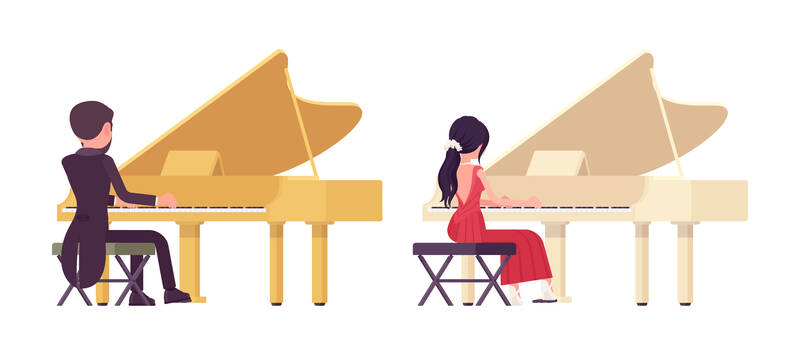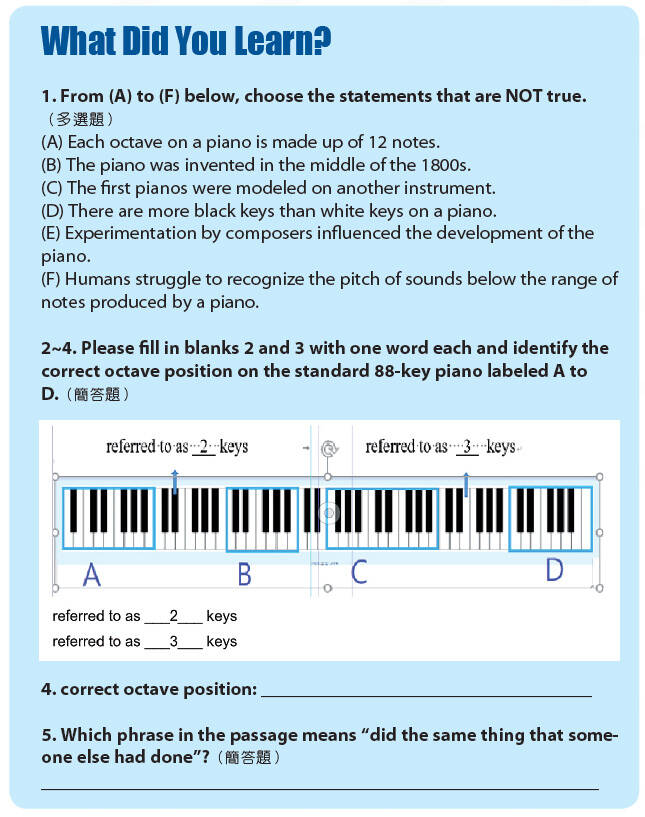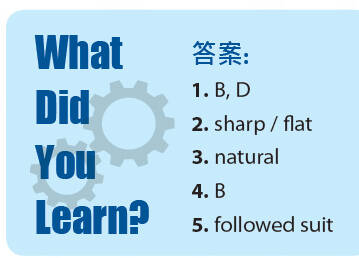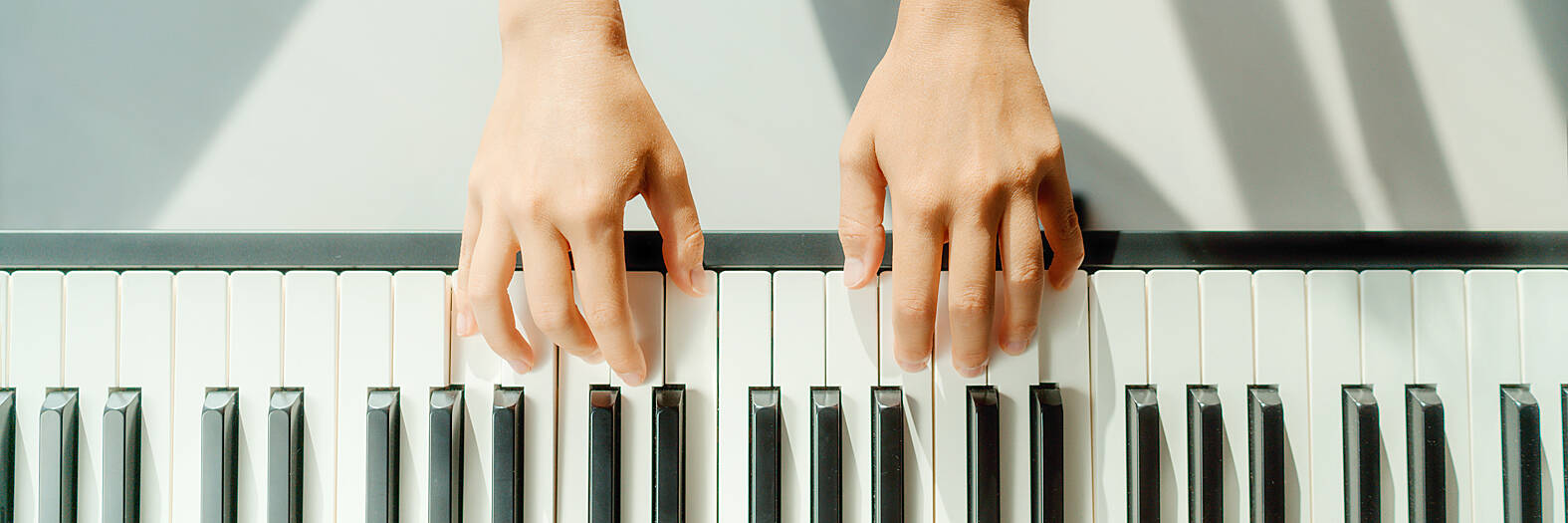Have you ever counted the number of keys on a piano? On a standard modern piano, the number of keys is 88. So, why is this the case?
The piano is believed to have been invented around the beginning of the 18th century. It was first created as a modified version of the harpsichord. Most harpsichords at the time had 60 keys—covering five octaves, with each octave comprising seven white keys and five black keys. That’s why the earliest pianos also had 60 keys. The white keys on a piano are called natural keys and correspond to the musical notes A, B, C, D, E, F, and G. The black keys, known as sharp or flat keys, represent notes that fall between pairs of natural keys in terms of pitch.
As the years went by and composers became more experimental in their work, many desired to compose pieces for piano that contained notes beyond the lower and upper boundaries of the 60-key piano. Accordingly, composers began to order larger pianos from piano makers, and by the mid-19th century, seven-octave pianos were common. It was in the late 1880s that piano manufacturer Steinway created the first 88-key piano. This model, consisting of 52 white and 36 black keys, spanned seven octaves plus four additional notes. Other manufacturers soon followed suit, and this form became the standard that we know today.

Photo: AdobeStock I 照片:AdobeStock
The adoption of the 88-key piano was also influenced by practical considerations. At the extremes of the piano keyboard, especially in the lowest and highest octaves, the human ear generally has trouble distinguishing between notes of different pitch. This is also one of the reasons why the 88-key piano has been widely adopted as the industry standard.
你有數過鋼琴上有幾個琴鍵嗎?在一架標準的現代鋼琴上,琴鍵的數目是八十八個。那麼,為什麼會是這樣呢?
鋼琴被認為是在十八世紀初期左右發明的。它最初是作為大鍵琴經改造而成的版本來創造的。當時大多數的大鍵琴有六十個琴鍵──涵蓋五個八度,每個八度包含七個白鍵和五個黑鍵。那就是為什麼最早的鋼琴也有六十個琴鍵。鋼琴上的白鍵被稱為自然鍵,相當於A、B、C、D、E、F和G這些音符。黑鍵則被稱為升鍵或降鍵,其代表就音高而言,介於兩個相鄰自然鍵之間的音。

Photo: AdobeStock I 照片:AdobeStock
隨著年月的流逝,作曲家在其作品中變得更加有實驗性,許多人渴望用含有超出六十鍵範圍之音符的鋼琴來譜曲。因此,作曲家開始向鋼琴製造商訂購更大的鋼琴,到了十九世紀中葉,七個八度的鋼琴變得普遍。而在1880年代晚期,鋼琴製造商史坦威創造出第一架八十八鍵鋼琴。這種鋼琴包含五十二個白鍵和三十六個黑鍵,橫跨七個八度,加上四個額外的音符。很快地,其他製造商紛紛仿效,這種形式成為了我們現今所熟知的鋼琴標準。
八十八鍵鋼琴的採用也受到實際考量的影響。在鋼琴鍵盤的兩端──特別是在最低和最高的八度──人耳通常難以分辨不同音高的音符。這也是八十八鍵的鋼琴被廣泛採用為業界標準的原因之一。
Words in use

Photo: AdobeStock I 照片:AdobeStock
1. precisely adv. 恰恰,正(用於強調)
I’m buying precisely three cups of coffee, so you can have one each.
我正好買三杯咖啡,所以你們一人一杯。

2. modified a. 改造的;修改的
The modified sports car moves at an incredible speed.
這款改良的跑車馳騁速度驚人。
3. comprise vt. 包含,由……組成
The committee comprises representatives from various departments.
這個委員會由各個部門的代表組成。
4. correspond vi. 相當,符合
correspond to N 相當於……,和……相符
Shelly’s story of what happened didn’t correspond to what I saw.
雪莉對事情經過的說法和我看到的不相符。
5. pitch n. 音高
Dogs can perceive sounds too high in pitch for humans.
狗狗能察覺到人類無法聽到的高音。
Practical Phrases
1. in terms of... 就……而言
The twin brothers are very different in terms of personality.
這對雙胞胎兄弟在性格上迥然不同。
2. follow suit 仿效,跟進
Whatever his elder brother does, Henry will follow suit.
無論哥哥做什麼,亨利都會仿效。
3. have trouble V-ing 做……有困難
Mr. Jones had trouble sleeping because he was worried about his finances.
瓊斯先生因為擔心財務問題,所以晚上睡不好。
聽文章朗讀及講解: https://ivy.pse.is/455bfu
本文出自常春藤解析英語雜誌: www.ivy.com.tw

A: Apart from the Taipei Music Center’s exhibit and concert, US pop rock band OneRepublic and rapper Doja Cat are touring Kaohsiung this weekend. B: OneRepublic is so popular that after tonight’s show at the K-Arena, they are set to return to Taiwan again in March next year. A: And Doja will also perform at the same venue on Sunday, right? B: Yup. Her collab with Blackpink’s Lisa and singer Raye for the song “Born Again” has been a huge worldwide success. A: Doja even made it on Time magazine’s “100 Most Influential People” list in 2023. She’s so cool. A: 本週末除了北流的特展和演唱會外,美國男團共和世代和饒舌歌手蜜桃貓朵佳也將來台開唱。 B: 共和世代因太受歡迎,繼今晚高雄巨蛋的演唱會後,預計明年3月即將再度來台巡演唷。 A: 朵佳本週日將在同場地開唱,對不對?

Just like fingerprints, your breathing patterns may serve as a definitive identifier. In a recent study, scientists have demonstrated an astonishing 96.8% accuracy in identifying individuals based on their respiratory patterns. This revelation could open up new possibilities in biometrics and personalized health monitoring. The notion of using individual breathing patterns as a distinct biological signature has long been a topic of discussion within the respiratory science community, yet a practical method for measurement remained elusive. This changed with the invention of a tiny, wearable device capable of extended recording. Researchers deployed a lightweight tube designed to fit inside

In most cities, food waste is often regarded as one of the most troublesome types of waste: it has a high moisture content, spoils easily and produces strong odors. If not handled properly, it can cause serious sanitation and environmental problems. From the perspective of the circular economy, however, food waste is not “useless leftovers,” but rather an organic resource that has yet to be effectively utilized. The core principle of the circular economy is to break away from the linear model of “production–consumption–disposal,” allowing resources to circulate repeatedly within a system and extending their useful life. Food waste occupies a

Continued from yesterday(延續自昨日) The study also uncovered a correlation between breathing patterns and mental well-being. Participants with higher scores on anxiety questionnaires exhibited shorter inhalation periods and more frequent breath pauses during sleep. “We intuitively assume that how depressed or anxious you are changes the way you breathe,” says one researcher involved in the study. “But it might be the other way around.” If this proves true, then training people to adjust their breathing may offer a novel approach to managing conditions like anxiety or depression. 該項研究也揭露了呼吸模式與心理健康之間的關聯。在焦慮問卷得分較高的受試者於睡眠期間表現出的吸氣時間較為短促、呼吸中止更為頻繁。一位參與研究的學者表示:「我們直覺地認為憂鬱或焦慮的程度會改變你的呼吸方式,但有可能是反過來的情況。」如果這一假設得到證實,那麼訓練人們調整呼吸的方式,可能會成為管理焦慮或憂鬱等疾病的新穎方法。 What Did You Learn? 1. What problem did scientists previously face when trying to measure breathing patterns? 2.